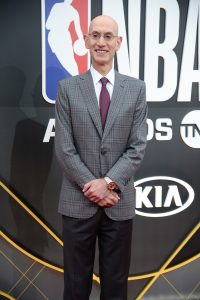Having rescheduled this year’s draft for November 18, the NBA has yet to officially set a start date for 2020’s free agent period. Speaking to Shams Charania of The Athletic, NBPA executive director Michele Roberts suggested that she thinks free agency will probably start no later than December 1 and that the salary cap and tax figures won’t drop too drastically from what was originally projected.
“We can’t go much beyond (December 1) for (free agency),” Roberts said. “We had a projected BRI (basketball-related income), which I think teams appropriately planned for. I don’t think we can deviate much from where we projected the cap to be.
“It may not reflect what people think is the likely BRI, but since I’m of the view this game is not dead and it will rebound, we can do some things with the cap to allow for a free market and not completely destroy what the teams were expecting the cap to be as they were planning ahead. Frankly, I think that’s going to be one of the easier negotiations, figuring out a cap.”
As Charania writes, Roberts met with NBA commissioner Adam Silver on Sunday, and the two sides left that meeting confident that they’ll be able to negotiate agreements on the many cap- and CBA-related issues that must be resolved before the new league year and the 2020/21 season begin.
“It’s amazing what needs to be accomplished in the next six weeks, but it has to be done. I feel sooner rather than later,” Roberts said, adding that she doesn’t believe there’s any real chance of a lockout. “… We’re going to resolve this.”
Charania’s Q&A with Roberts is jam-packed with interesting info and quotes, and is worth checking out in full if you’re an Athletic subscriber. Here are a few more of the most notable takeaways from the conversation:
- Roberts still views January as the “absolute earliest” possible start date for the 2020/21 season. “The latter part of January, February makes sense,” she told Charania. “If it’s later than that, if we have a terrible winter because the virus decides to reassert herself, that’s fine.”
- Although Roberts and the NBPA share the NBA’s hope that teams can play a full 82-game season in their respective home arenas in 2020/21, she told Charania that the two sides must be “flexible” and “nimble” as it makes plans for next season. “I’m not of the view that we should wait until we think the arenas can open, because this virus, she’s not cooperative at all,” Roberts said.
- Silver has expressed some reluctance to change the NBA’s permanent calendar as a result of the COVID-related delays, but Roberts sounds more open to that possibility. “Even before COVID happened, there was a conversation about starting our season later. Why compete with football in the fall? Why don’t we start our season around Christmas?” Roberts said to Charania. “It may very well be that our regular schedule is going to change, not so much because of COVID, but because of the ability to experiment. I wouldn’t bet on returning to the old normal.”
- Faced with the possibility of the NBA’s basketball-related income for next season dipping from $8 billion to something like $6 billion, Roberts acknowledged that maintaining the 51/49 split between players and owners will be tricky. “It comes down to if it’s a $6 billion pie and our owners are entitled to 49%, and they’re already committed to $5 billion in player salaries and fixed costs for example, where’s the rest of their money?” she said. “There’s ways to take that $6 billion and get to their 49%. One of the ways to do it is to slash player salaries. I got to deal with a constituency that, you slash their salaries, this may be for many of my guys on the last two or three years of their careers. Is there a way to deal with that?”
- Here’s more from Roberts to Charania on the issue of the BRI split: “We’ll never say to the owners: ‘Y’all just going to have to eat the loss.’ Who’s going to do that? They’re not stupid. They’re not just going to say, ‘OK, yeah you’re right, we’re just going to have to lose a couple billion dollars on our own.’ That’s not going to happen. Instead what you say is, ‘Can we figure out a way to manage that so there is no loss, but there isn’t an immediate pay day. Can you withstand some delay in getting your money?’ I have some real life examples of people I know in my life that say that they live paycheck-to-paycheck. And there are other people that can say that they can deal with deferred compensation. You figure it out.”
